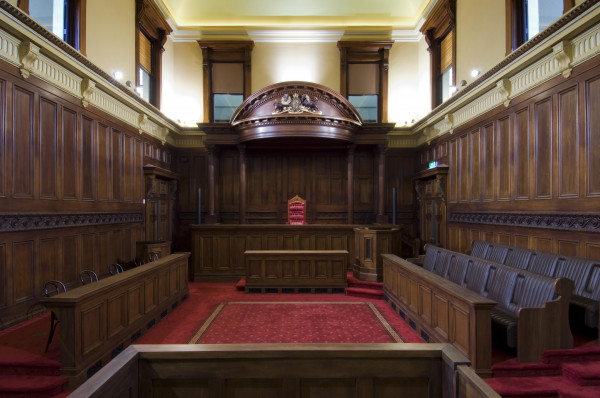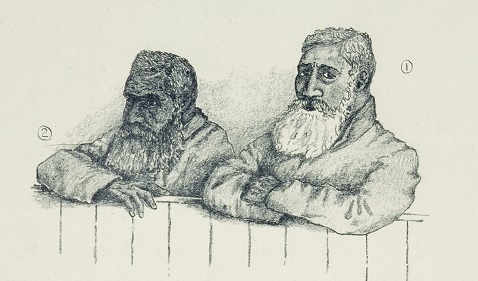The Old High Court – Te Whiti and Tītokowaru
After what was reported as “Serious Native Aggression at Manaia” Te Whiti-o-Rongomai (the Prophet of Parihaka), Riwha Tītokowaru and 8 followers appeared in the Old High Court in October 1886 after being charged with forcible entry and riot.
Māori enter land claimed by a European
Earlier in July of 1886 roughly 500 Māori with 150 horses entered land that had been claimed by Mr Hastie, a European who had settled there with his family. They erected a whare and 18 tents and brought firewood onto the site to cook dinner. They invited some of the Europeans to dinner, including Constable Franklyn, but most declined. Europeans from Hawera then began to arrive in more force and soon they were almost equal in number to the Māori.
European horsemen rounded up 65 of the horses and 20 cattle belonging to the Māori. Some used their stock whips on the Māori and on the cattle. Many Europeans used their clubs freely and 2 or 3 Māori had their heads severely cut. The horses and cattle were driven to the pound some distance away.
By late afternoon able-bodied Europeans had greatly outnumbered the Māori. Special constables were sworn in and the men leading the Māori were arrested. The remaining Māori left the area, showing no resistance.
“Seeing the bad plight in which some of the Māori were likely to be for want of horses to take food to the nearest kainga, 1 or 2 of the settlers offered to subscribe a pound or 2 to help them to release some of them. The natives, however, said they would take no money until they had talked over the affairs. The night will be cold, and many of them will probably be exposed all night with little shelter or clothing. Your reporter rode 7 miles in under half an hour with the object of getting this message away in time for the telegraph.”
- The Evening Post, 6 October 1886
Inspector Pardy, the officer in charge of the area, took control of the prisoners.
Appearance in the Old High Court
In October 1886 Te Whiti, Tītokowaru and 8 followers appeared in the Old High Court in front of Chief Justice Prendergast. Te Whiti’s offence was that he incited the other prisoners to enter upon the land claimed by Mr Hastie. They all pleaded guilty after some discussion with the judge.
|
Detail from a drawing by Walter Jefferson Leslie at the trial of Te Whiti [Wellington]. The Evening Press 1886. Ref: B-034-015 Alexander Turnbull Library, Wellington, New Zealand. Titokowaru (left) Te Whiti (right) |
The Chief Justice then permitted Te Whiti to address the court:
“I am the original owner of the land. You, the white-faced people, came in a cloud, or army, and turned me off the land. When I got sufficient courage to re-enter, my hand was put forth again. We and others were expelled from the land. We were not expelled peaceably, but by the guns of the Government. When I rose from the ground, the pain of the blow I received was still great, but I still put out my hand. I was then tried by law, but those who turned me from the land were not tried. That is all I have to say to your Honour – not many words.”
- Te Whiti-o-Rongomai
Te Whiti was sentenced to imprisonment for 3 calendar months and fined 100 pounds. The others were sentenced to imprisonment for 1 calendar month and fined 20 pounds.
---------------------------------------------------
The above account is taken from newspaper reports of the event and the court case which appear on the National Library website in the Papers Past section.
Resources
- Serious Native Aggression at Manaia, The Evening Post (19 July 1886)
- The Māori Rioters in Court, The Evening Post (6 October 1886)
- The trial of Te Whiti, drawing by Walter Jefferson Leslie, The Evening Post (1886)


